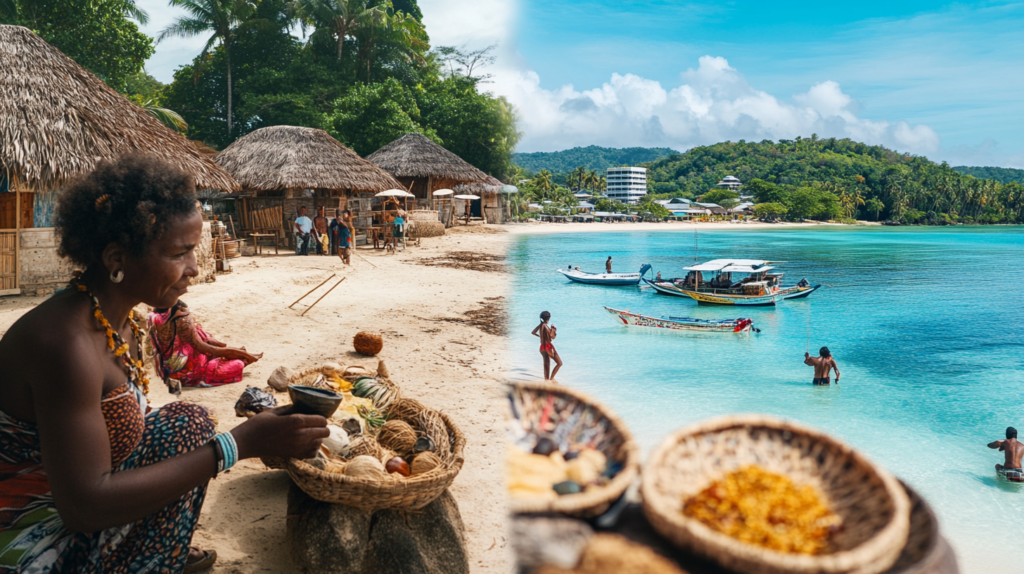The Economy of Vanuatu: A Detailed Analysis from 2019 to 2024
Nestled in the South Pacific Ocean, Vanuatu is an archipelago of 83 islands that boasts a unique blend of cultural heritage and natural beauty. The country’s economy from 2019 to 2024 has experienced significant fluctuations due to a series of challenges and opportunities. This period has been influenced by global economic shifts, natural disasters, and the COVID-19 pandemic, all of which have shaped Vanuatu’s economic landscape. Despite these hurdles, Vanuatu’s economy has demonstrated resilience, driven by its key sectors: tourism, agriculture, and foreign aid.
Economic Performance and Key Developments
2019: A Year of Steady Growth
In 2019, Vanuatu’s economy was on a steady growth trajectory. The country’s GDP was primarily driven by tourism, contributing significantly to revenue. Over 100,000 tourists visited Vanuatu in 2019, attracted by its pristine beaches, diving spots, and vibrant cultural festivals. The construction sector also contributed to economic growth, with several infrastructure projects underway, including roads, ports, and tourism facilities.
Agriculture continued to play a crucial role, with copra, kava, cocoa, and beef being the main export products. The agricultural sector provided employment to a large portion of the population and contributed significantly to the country’s foreign exchange earnings.
2020: The COVID-19 Pandemic and Economic Contraction
The onset of the COVID-19 pandemic in early 2020 brought unforeseen challenges to Vanuatu. The government implemented strict measures, including border closures and lockdowns, to prevent the virus’s spread. While essential for public health, these measures severely impacted the economy.
Tourism, the backbone of Vanuatu’s economy, was hit hardest. With international travel restrictions in place, tourist arrivals plummeted, leading to a substantial revenue decline. Hotels, restaurants, and tour operators faced unprecedented challenges, resulting in layoffs and business closures.
The agricultural sector also faced disruptions. Export markets were affected, and supply chains were interrupted, leading to difficulties in getting products to market. Farmers struggled with decreased demand and logistical challenges, exacerbating their financial strain.
2021: Recovery Efforts and Resilience Building
In 2021, the Vanuatu government introduced various measures to support economic recovery. Stimulus packages aimed at cushioning the impact on businesses and households were rolled out. These included direct financial assistance, tax relief, and subsidies for affected sectors.
The tourism industry began to see a gradual recovery as global vaccination efforts gained momentum and travel restrictions eased. The government and tourism operators worked together to promote Vanuatu as a safe and attractive destination. Emphasis was placed on sustainable tourism practices, leveraging the country’s natural and cultural assets to attract visitors.
The agricultural sector received support through initiatives to enhance productivity and diversify crops. Programs to improve farming techniques, provide access to finance, and develop new markets were implemented. Kava, a traditional drink with cultural significance, saw increased international demand, offering new opportunities for farmers.
2022: Infrastructure Development and Diversification
By 2022, the focus shifted towards building a more resilient and diversified economy. Infrastructure development became a priority, with significant investments in transportation, communication, and energy. Improved roads, ports, and airports facilitated trade and tourism, while better telecommunications infrastructure supported business operations and connectivity.
Efforts to diversify the economy included promoting sectors such as renewable energy, fisheries, and manufacturing. Renewable energy projects, particularly solar and wind, were initiated to reduce reliance on imported fuels and enhance energy security. The fisheries sector, rich in tuna and other marine resources, was targeted for sustainable development and value addition.
The government also encouraged foreign direct investment (FDI) by creating a more business-friendly environment. Policies to streamline business registration, improve regulatory frameworks, and provide incentives for investors were implemented.
2023: Climate Resilience and Sustainable Development
In 2023, climate resilience emerged as a critical focus area for Vanuatu. The nation is highly vulnerable to the impacts of climate change, including rising sea levels, extreme weather events, and natural disasters such as cyclones. The government prioritized climate adaptation and mitigation strategies to protect communities and the economy.
Community-based disaster risk management programs were expanded, emphasizing local knowledge and participation. Infrastructure projects incorporated climate-resilient designs, ensuring they could withstand extreme weather conditions. The government also worked with international partners to secure funding and technical assistance for climate resilience initiatives.
Sustainable development practices were promoted across sectors. In agriculture, efforts to promote organic farming, agroforestry, and sustainable land use practices gained momentum. In tourism, eco-friendly accommodations and activities were developed, attracting environmentally conscious travelers and ensuring the conservation of natural resources.
2024: Looking Ahead
As of 2024, Vanuatu’s economy continues to navigate a complex landscape, balancing recovery, growth, and sustainability. The tourism sector is poised for further growth, supported by ongoing infrastructure improvements and targeted marketing efforts. New markets, including adventure tourism and cultural tourism, are being explored to diversify offerings and attract a broader range of visitors.
The agricultural sector remains a cornerstone of the economy, with continued emphasis on value addition and diversification. The kava industry, in particular, is thriving, driven by robust international demand. Initiatives to improve agricultural productivity and sustainability are crucial for long-term growth.
Digital transformation is gaining traction, with initiatives to enhance digital literacy and expand access to technology. These efforts are expected to improve business operations, education, and access to services, contributing to overall economic development.
Key Sectors and Their Evolution
Tourism
Tourism has long been a vital part of Vanuatu’s economy. The sector experienced significant growth until the COVID-19 pandemic brought unprecedented challenges. The recovery has been gradual, with efforts to rebuild and promote Vanuatu as a safe and sustainable destination. Investments in eco-tourism and cultural tourism are expected to drive future growth, attracting visitors seeking unique and environmentally responsible experiences.
Agriculture
Agriculture remains a key pillar of Vanuatu’s economy. The sector faced challenges during the pandemic but has shown resilience. Diversification and value addition are central to its development, with a focus on organic farming and niche products. Kava, a culturally significant crop, has seen increased demand, offering new opportunities for farmers. Efforts to enhance productivity and sustainability are critical for the sector’s future.
Infrastructure and Investment
Infrastructure development is essential for supporting economic growth. Investments in transportation, communication, and energy infrastructure have improved connectivity and facilitated trade and tourism. Foreign direct investment (FDI) is encouraged, particularly in sectors like tourism, agriculture, and renewable energy. Policies to create a business-friendly environment and attract investors are key to sustaining economic growth.
Climate Resilience
Vanuatu’s vulnerability to climate change requires proactive measures to build resilience. The government is investing in climate adaptation and disaster risk reduction strategies, including resilient infrastructure and community-based initiatives. International cooperation and funding play a crucial role in supporting these efforts, ensuring that Vanuatu can mitigate the impacts of climate change and protect its communities and economy.
Conclusion
The period from 2019 to 2024 has been transformative for Vanuatu’s economy. The nation has faced significant challenges, including the COVID-19 pandemic, natural disasters, and climate change impacts. However, through resilience and adaptability, Vanuatu has navigated these challenges and laid the groundwork for a more resilient and diversified economy.
By focusing on sustainable tourism, diversified agriculture, and infrastructure development, Vanuatu is positioning itself for long-term growth. Continued efforts to address climate change, leverage digital transformation, and attract investment are essential for ensuring sustainable and inclusive development. As Vanuatu looks to the future, its commitment to resilience, sustainability, and innovation will be key drivers of its economic success.

The strength of its tourism and agricultural sectors, coupled with strategic government interventions, underscores the nation's capacity to transform adversity into opportunity.
